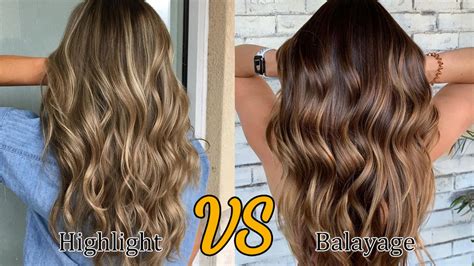Introduction
When it comes to hair color, there are two techniques that reign supreme: balayage and highlights. Both methods can create beautiful, natural-looking results, but there are some key differences between the two. In this article, we’ll break down the 10 most important distinctions between balayage and highlights so that you can decide which technique is right for you.

1. Application Method
Balayage: Balayage is a freehand technique where the color is painted onto the hair in sweeping motions. This creates a soft, blended look with no harsh lines of demarcation.
Highlights: Highlights are created using foils or plastic caps to isolate sections of hair. The color is then applied to these sections, resulting in a more defined, contrasting look.
2. Placement
Balayage: Balayage is typically applied to the mid-lengths and ends of the hair, creating a sun-kissed effect.
Highlights: Highlights can be placed anywhere on the head, from the roots to the tips. They are often used to frame the face or add dimension to the hair.
3. Color Intensity
Balayage: Balayage typically results in a more subtle, natural-looking color. The color is blended gradually, so there is no harsh contrast between the highlighted and unhighlighted areas.
Highlights: Highlights can be more intense, depending on the desired look. They can be used to create a bolder, more dramatic effect.
4. Maintenance
Balayage: Balayage requires less maintenance than highlights. Because the color is blended, it grows out more seamlessly and does not require frequent touch-ups.
Highlights: Highlights require more maintenance. The color needs to be touched up every 6-8 weeks to keep the contrast visible.
5. Cost
Balayage: Balayage is typically more expensive than highlights. This is because it is a more time-consuming technique and requires more skill from the stylist.
Highlights: Highlights are typically less expensive than balayage. They are a more straightforward technique and can be done more quickly.
6. Versatility
Balayage: Balayage is a versatile technique that can be used to create a variety of looks, from subtle highlights to bold ombré.
Highlights: Highlights are less versatile than balayage. They are best suited for creating a more defined, contrasting look.
7. Damage
Balayage: Balayage is less damaging to the hair than highlights. This is because the color is not applied to the roots, which are the most delicate part of the hair.
Highlights: Highlights can damage the hair, especially if they are done frequently. The bleach used to lighten the hair can weaken the hair shaft and make it more prone to breakage.
8. Longevity
Balayage: Balayage lasts longer than highlights. This is because the color is blended, so it grows out more seamlessly.
Highlights: Highlights fade more quickly than balayage. They need to be touched up more frequently to keep the color looking fresh.
9. Which technique is right for me?
The best way to decide which technique is right for you is to consult with a hairstylist. They can help you assess your hair type and desired look to determine which method will give you the best results.
10. Benefits of balayage and highlights
-
Balayage:
- Creates a natural, sun-kissed look
- Less damaging to the hair
- Requires less maintenance
- Can be used to create a variety of looks
-
Highlights:
- Can create a more defined, contrasting look
- Can be used to add dimension to the hair
- Can be placed anywhere on the head
Conclusion
Balayage and highlights are both beautiful hair color techniques that can give you the look you desire. The best way to decide which technique is right for you is to consult with a hairstylist. They can help you determine which method will give you the best results based on your hair type and desired look.
Additional Tips
- If you have fine hair, balayage is a good option because it will add volume and dimension to your hair.
- If you have thick hair, highlights are a good option because they will add contrast and depth to your hair.
- If you are looking for a low-maintenance color, balayage is a good option.
- If you are looking for a more dramatic color, highlights are a good option.
